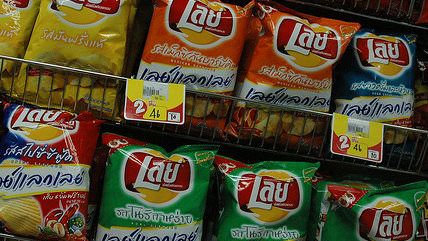The Bogus Case Against Junk Food
Anti-food nannies launch their latest attack.

A recent cover story in The New York Times Magazine offers a shocking exposé of Big Food. In granular detail it relates the food conglomerates' "hyper-engineered, savagely marketed, addiction-creating battle for 'stomach share.'" If you don't have the time to slog through the nearly 10,000 words, though, here's the big news in this shocking, horrifying, and incredibly alarming story.
You might want to sit down for this.
All set?
Here it is: Food companies work very, very hard to find out what will give you, the consumer, the most pleasure for your money—and then the diabolical fiends actually give it to you!
Seriously, you are supposed to be absolutely horrified by this. You can tell by the ominous language the author, Michael Moss, employs to describe how "food engineers alter a litany of variables with the sole intent of"—brace yourself—"finding the most perfect version" of a product. The most perfect version, of course, is the one that will "be most attractive to consumers." (The horror.) The piece even quotes one food-company executive who describes the strategy: "Discover what consumers want to buy and give it to them with both barrels."
This is hardly a new theme in the progressive press. You can read dozens of variations on it, if you care to. "How the Food Industry Is Enabling the United States' Obesity Epidemic" (ThinkProgress); "Snacks for a Fat Planet" (The New Yorker); "Can Big Food Kick Its Obesity Habit? Does It Really Want To?" (NPR); "How the Food Makers Capture Our Brains" (The New York Times, again).
Some of this is simply good, old-fashioned muckraking. Progressives love nothing better than to uncover a diabolical plot by corporate fat cats seeking to further engorge themselves by destroying the lives of the helpless and unsuspecting—preferably children, or perhaps simple but cinematically attractive small-town folk with hearts of gold. (Packaged food isn't the only industry with a formula.)
What makes it funny in the food case is the root of the objection: the voluntary relationship between the supplier and the consumer. Customers want certain things, and companies do their utmost to provide them. The Times Magazine piece feebly tries to suggest something much darker is going on, by repeating the word "addiction" (even though it's not warranted) and by noting "the body's fragile controls on overeating." Not to mention the "savage" marketing. (Go ahead and laugh, it's OK.)
But mostly it's about how food companies do a lot of research on things such as the perfect break point for a potato chip: Like Goldilocks and her preference for mattresses, people want chips that are not too hard and not too soft.
Somehow, progressives have concluded that striving to satisfy consumer preferences is a sneaky, underhanded thing to do, and therefore wrong. Private corporations, many progressives seem to believe, should not be trying to entice you to buy their commercial products by making those products extremely attractive.
Which, when you think about it, is hilarious.
Why? Because progressives have no compunction whatsoever about using the coercive power of the state to make you buy a commercial product whether you want it or not. Just eight months ago, progressives were whooping and high-fiving over the Supreme Court's ruling that the federal government can force you to buy health insurance. Now they're going to war again over the government's power to make religious institutions buy contraception coverage. Indeed, the principal progressive project for the past several decades has been to supplant the voluntary and consensual arrangements of the free market with involuntary and coercive arrangements imposed by government.
One possible comeback, of course, is that people who choose freely often choose things that are bad for them (e.g., potato chips and cola), whereas progressives only want what's best for people. That seems to be New York Mayor Michael Bloomberg's justification for banning large sodas, for instance. But using force to impose things that are good for people is wrong, most progressives say—at least when it comes to foreign policy.
Throughout the Bush years, large numbers of progressives railed against the use of coercive military power to achieve desirable ends, such as the spread of democracy. It was the height of imperialist arrogance, they said, to try to force American values on the rest of the world. In a 2008 piece in The Nation about Barack Obama's foreign policy, Robert Dreyfuss observed that "U.S. involvement abroad, even when well-intentioned, is perceived on the receiving end as heavy-handed meddling." (U.S. involvement at home is often perceived the same way.) Piece after piece on the left lamented American "bullying" and advocated instead "soft power"—trying to persuade those abroad to see things our way through diplomacy and attraction.
Yet when it comes to ordering the American public about, hard-power bullying apparently is not only perfectly fine, it is considerably more preferable than soft-power techniques such as, oh, making food taste good—which is just plain wrong. To paraphrase a certain businessman, many progressives seem to believe it is better to decide what consumers would want, if they weren't such drooling idiots—and then give it to them with both barrels.
This article originally appeared in the Richmond Times-Dispatch.
